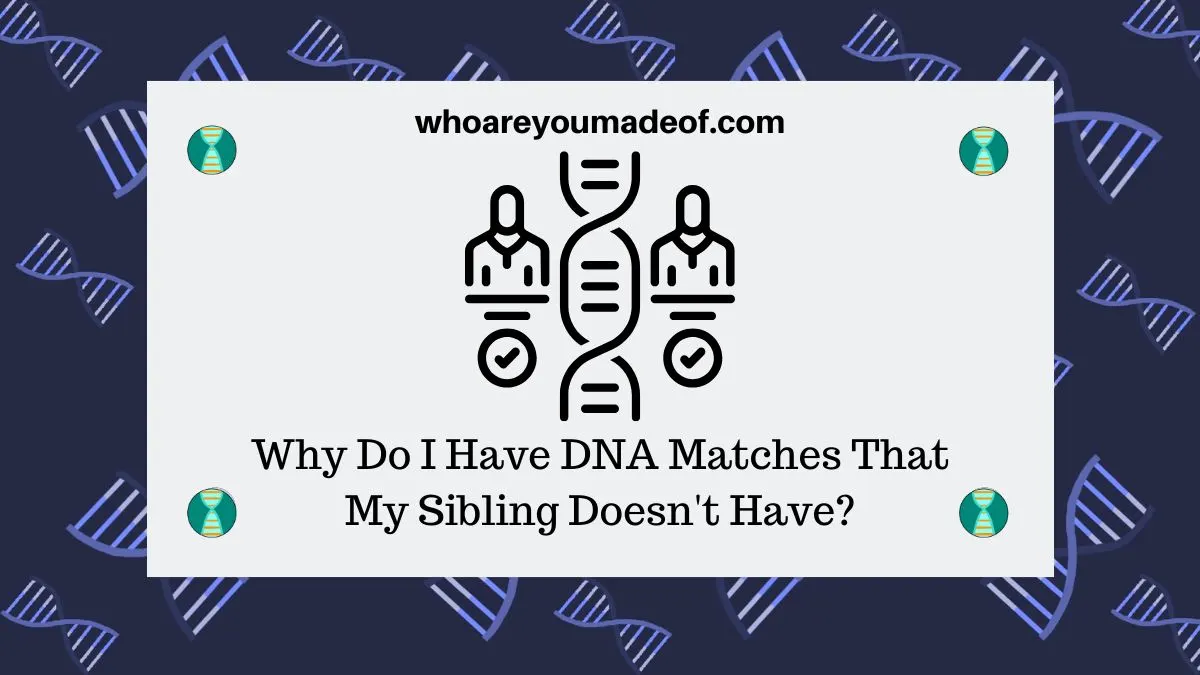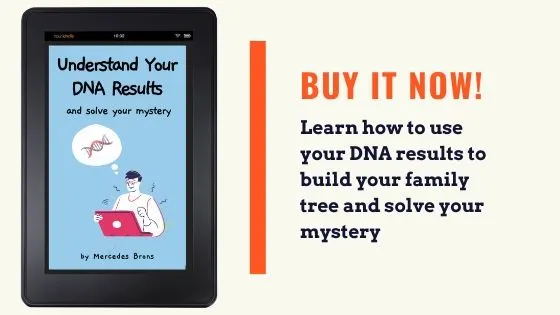If you and your siblings took a DNA test, you may have seen that your DNA match lists are not identical. In this post, learn why you have DNA matches that your brother or sister doesn't have.

This is one of the most common questions that people ask about DNA matches. They may have a DNA match that doesn't match their sibling, and they wonder what it means.
It may even lead them to doubt the accuracy of their DNA matches.
Believe it or not, it is normal to have DNA matches that your sibling doesn't have. And it's normal for them to have DNA matches that don't match you, either!
It's normal for siblings to have different DNA matches
Siblings will have a different number of DNA matches, and some DNA matches will not be on both lists. The more distantly a person is related to the group of siblings, the higher the chance that the relative will not show up on all of the siblings' DNA match results.
It's also normal for siblings to have a different number of DNA matches, especially if they tested with a site that doesn't limit the number of DNA matches a person can have.
For example, my mother has 17,898 matches, her full sister has 19,597, and her full brother has 16,301. All three of them share the same parents, but they all have a different number of DNA matches with the same DNA testing company.
Why do I have different DNA matches than my siblings?
The reason that you and your sibling have different DNA matches is because you each inherited slightly different DNA from your parents. Siblings only share about 50% of their DNA with each other, meaning that half of your sibling's DNA doesn't match yours, and vice versa.
Having different DNA matches doesn't mean that you and your siblings don't share the same two parents. Though it can, if you are half-siblings. Check your matching centimorgans (cMs) before ruling that out!
We all get 50% of our DNA from our parents, but not the same 50% as our siblings.
Imagine that you are blindfolded, reaching each hand into two hats. Each hat contains the DNA (or genes) of your mother and father. Imagine that you take half of the DNA out of each hat.
Then, imagine your sibling doing the same thing (but imagine that all of the DNA was still in the hat... it's never-ending DNA).
What do you think the odds are that both you and your sibling grabbed the exact same 50% out of each hat?
The answer is that it is almost impossible for two (non-identical twin) siblings to have the exact same DNA. It turns out that two siblings share approximately 50% DNA - sometimes a little more, sometimes a little less.
The consequence of this is that since there is some DNA from your parents that you got, and your brother didn't get, and some that you didn't get that your brother got, there will be people on your DNA match list that match one of you, and not the other.
Even though you are all genealogically related (you are in the same family tree, whether you actually share DNA or not).
The other situation that occurs almost all the time is that one sibling will share more or less DNA with a cousin match than the other sibling.
An example of how two full siblings share different amounts of DNA with the same cousin
Both my grandmother and her brother have taken the Ancestry DNA test. They are full siblings. There is a cousin match on both of their pages who is still a mystery to me. Let's call him "Jack".
- Jack matches my grandmother at 76 centimorgans (cMs) and is under the 4th-6th cousin category on her match list.
- Jack matches my "Uncle Bob" at 354 cMs and is under the 1-2nd cousin category on his match list.
While I still haven't figured out how this happened, I do have a theory:
(Note: This is assuming that Jack's tree is correct. If one of his great-grandparents really isn't his great-grandparent, and is one of my great-grandparents, well, then this theory wouldn't apply)
I believe that Jack is related to me in a few different ways, based on the knowledge that my grandmother's family has been in the U.S. for centuries.
This means that there are multiple DNA segments from multiple lines that could have potentially matched my grandmother. In other words, mostly likely both of my grandmother's parents had several segments that would have matched Jack.
But since DNA is inherited randomly, and we only get 50% of our DNA from each parent, my grandmother randomly got less of the segments that match Jack from her parents. And her brother probably got most or all of them. Randomly.
Maybe someday I will figure out who Jack is. If I do, I'll write a post about it!
Do you want to get more from your DNA results?
If you have already done a DNA test, it's important for you to know that building a family tree is the best way to get the most from your DNA results.
I recommend building trees on Ancestry. It's free to do so, but having a subscription comes in handy for viewing records and helpful family documents.
Conclusion
I hope that this post helped you understand a little bit more about how you and your siblings can have different DNA matches, and why you might share different amounts of DNA with the same relative.
What do you think? Did you find any mysteries among your match list that didn't match your sibling? I'd love to hear from you in the comments below.
Thanks for stopping by!


Jane C.
Saturday 7th of October 2023
I am stuck on the lineage for my maternal gr.gr.grandmother.I have found a fair amount of matches for her husband's ancestors and she is buried next to him so I feel confident she is related by blood as I have them traced back as married for several years prior to my gr.gr.grandmother's birth. I've spent countless hours pouring through documents, family histories with her maiden name, vital & church records to no avail. I tried to find DNA match searches with her maiden name. I've found several matches that include her maiden name, however they aren't consistent enough to rely on. The only thing I can figure is that my gr.gr.grandmother was possibly an only child & perhaps her parents came from small families. Do you have any other ideas to help me find her ancestors?
Maryann
Sunday 16th of May 2021
Here is my dilemma, According to the results below we are a close match. Possible 1st cousin or 1st cousin once removed. BUT '?' is 20+ years younger than me. How can we be 1st cousins etc?
You and ? Shared DNA: 619 cM across 23 segments Unweighted shared DNA: 619 cM Longest segment: 77 cM
Denise
Sunday 3rd of January 2021
My mother has several cousins that show up between 4th-6th cousins on Ancestry that have 30+crm's, but they do not show up on mine, even when selecting the 'distant cousin search.' Yes my mom shows up as my mom. This is so shocking to me and of course a bit saddening. Am I not really related to them or is the trace so small in me, it does not show up? They just uploaded my profile a month ago....could they show up later or could they show up under another DNA company like 23andme?
Cher
Wednesday 10th of March 2021
Hi Denise,
Remember that you only receive 50% DNA from each parent and therefore it is perfectly normal that you would not share DNA with some of your mother’s cousin matches as there is another 50% DNA you did not inherit from your mother. (Same applies to your father). These cousin matches of your mother are still your cousins from a genealogical perspective. You just didn’t inherit DNA from the common ancestor.
PPatatricia
Friday 27th of November 2020
I'm curious, if children get 50% from each parent how it is that my heritage, which is primarily 37% Norwegian and 47% english, and my then husband had almost 100% native American Indian, that I have a son with 50% Indian and my daughter has 31% Indian, but has 46% English 3% Spanish, and traces of Basque, Senegal, Mali, European Jewish, Cameroon and Bantu?
Not any of those came from my side, and if my son is 50% American Indian, doesn't that mean that his father has to be full blooded, and if he is full blooded then where do those traces for my daughter come from?
Pat Krenik
Mercedes
Monday 30th of November 2020
Hi Pat, Children do get 50% of their DNA from each of their parents. However, it is a randomly selected 50%. All we really know for sure is that your children's father had at least 50% Native American DNA, since you know for sure that this region must have come from their father. It's possible for all of one particular region to get passed down (especially when it is a large percentage of someone's ancestry) and none of another, or more or less than 50% of a region to get passed down. Since your daughter only received 31% Native American compared to her brother's 50%, we know that her father would not show 100% Native American on a DNA test. This means that the other regions that are showing up for her were likely inherited from their father. Your son simply happened by chance to inherit all of his father's largest DNA region. I hope that this explanation helps! Sincerely, Mercedes